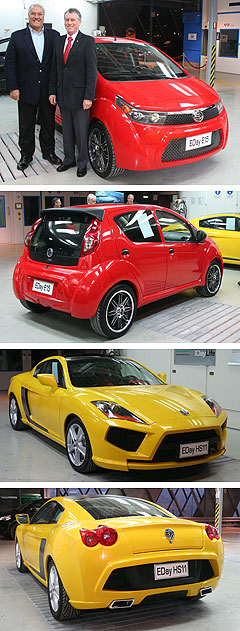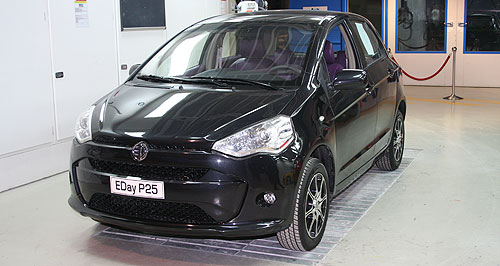Make / Model Search
Future models - EDay - E15AIMS: Aussies put electric cars on trialGreen niche: The first EDay Life electric vehicle is based on a mystery Chinese petrol-powered small car. Eday electric hatchback set for Victorian trial ahead of 2012 roll out1 Jul 2011 THE first 100 Chinese-made full-electric cars from fledgling Australian brand EDay Life will be leased to customers in Melbourne as part of the Victorian government’s electric-vehicle trial. The cars – based on an existing petrol-powered small car made by a mystery Chinese car-maker – are scheduled to hit the road in the first quarter of 2012, armed with data loggers to provide feedback to EDay, a start-up company founded by former Holden engineering director Laurie Sparke and one-time Melbourne car dealer Robert Lane. “These will be our test drivers,” Mr Sparke said. “We won't have proving grounds and so on – these cars will be driven on the road by ordinary customers. “As part of the lease, we will require the customers to bring their cars in once a month so we can download the data and get driver feedback.” Mr Sparke said that provided the trial was successful, EDay should being importing cars three to six months later for wider distribution, offering them on the internet and without traditional dealerships, possibly just a few café-style showrooms in major cities where trade-ins would not be accepted. EDay hopes to offer electric-powered cars at half the price of pioneering EVs from Mitsubishi and Nissan, potentially making them available at a similar price to current petrol small cars. In a further step away from the traditional new-car sales model, trade-ins will not be accepted.  From top: Robert Lane and Laurie Sparke with the E15, HS11 concept. From top: Robert Lane and Laurie Sparke with the E15, HS11 concept.EDay today used the Australian International Motor Show in Melbourne to unveil one of the three environmentally friendly EDay models that the company hopes to offer to drivers in Australia under the new system of car ownership that they say represents the end of the 110-year-old model of the auto industry. Under the plan, the cars will be leased to customers for two years and then returned to EDay for a complete refurbishment, with the latest improved batteries, new tyres, brakes and paint touch up included. However, EDay says it will not be able to determine the price of the lease or the cost of refurbishment until closer to launch. The lease will include a CSIRO-developed Home Energy Management system that includes roof-top solar panels to offset the charging of the car’s batteries, an additional storage battery using recycled lithium-ion car batteries and a management system. As well, it will include the installation of an office charger if needed. The battery storage is designed to not only store energy for the car but also to provide power for household use, although Mr Lane said the details of the how the package would be supplied were still up in the air because of issues surrounding government rebates paid only to the householders paying directly for the system. Although the EDay-branded cars will be designed and made in China, the specification and some elements of the engineering will be controlled from EDay’s Melbourne headquarters. The prototype five-door five-seat E15 city hatchback shown at the Australian International Motor Show today is powered by lead-acid batteries, but the production car will have modern lithium-ion batteries with a claimed range of 150km and a top speed of 100km/h. The E15 is likely to be the second EDay model to make it market. The first will be the E25, a larger five-door hatchback that will be launched in EV guise but ultimately will also be offered with petrol and LPG powertrains if customers prefer. A hybrid two-seat sports coupe is also under consideration. EDay has a bright yellow prototype in Melbourne for assessment. Clothed in fibreglass and sitting on a frame chassis, the HS11 concept is powered by a 2.4-litre Mitsubishi petrol engine with an electric motor that is said to be good for 30km on electric battery motivation before a further range of 400km on petrol. Mr Sparke said EDay had engaged Australian-based supplier Futuris to design a new interior for the E25, the prototype of which has blinding purple upholstery from the Chinese manufacturer. He said the cars would be made by “China’s top manufacturer”, although he and Mr Lane declined to name the company, saying they wished to keep the details confidential. Mr Sparke, who was a renowned crusader for car safety in his time at Holden where he ran the leading-edge engineering unit Holden Innovation, said the E25 had yet to be crash tested, but he expected it to get a four-star ANCAP rating. Technically, the first batch of cars to arrive in Australia will be engineering evaluation cars brought into the country under the low-volume import rules that allow importers to skip the full Australian Design Rule process. Mr Sparke said that although the launch of the first model was only a matter of months away, he and Mr Lane had been working on the project for five years and that the cars would be ready to roll. He said that ultimately, he wanted to incorporate super-capacitor battery technology invented by the CSIRO and now made by spin off Capex in Sydney. This would cut the weight of the car while increasing performance over the current best lithium-ion battery technology. Three of Mr Sparke’s former work colleagues at the now-defunct Holden Innovation are also working on the project through their own new company, CurveTomorrow, which is supplying a hi-tech car control system, called the EPad. Based on an iPad, the EPad is said to be an Australian first, providing the interface for a range of vehicle functions such as entertainment, navigation and phone, while also doubling as a removable iPad. Sitting in a docking station in the car, the EPad is said to “connect drivers to their vehicles in ways never seen before”, including recording data from vehicle use and remotely controlling vehicle charging and cooling or heating the car during charge cycles ahead of driving. Part of the Futuris design brief is to provide an appropriate docking position for the EPad in the console/dash. Mr Sparke said the EPad would appeal to geeks wanting to have the latest in technologically advanced products. Once EDay begins importing cars, the brand will become the eighth brand of Chinese-made cars in Australia.  Read moreAll motor show Alfa Romeo Alfa Romeo Abarth Abarth Alpine Alpine Alpina Alpina Audi Audi Aston Martin Aston Martin BMW BMW Bentley Bentley Chery Chery Brabham Brabham Chrysler Chrysler Chevrolet Chevrolet Cupra Cupra Citroen Citroen DS DS Dodge Dodge Fiat Fiat Ferrari Ferrari Foton Foton Ford Ford Great Wall Great Wall FPV FPV Haval Haval GWM GWM Honda Honda Holden Holden Hummer Hummer HSV HSV Infiniti Infiniti Hyundai Hyundai Jaguar Jaguar Isuzu Isuzu Kia Kia Jeep Jeep Land Rover Land Rover Lamborghini Lamborghini Lexus Lexus LDV LDV Mahindra Mahindra Lotus Lotus Mazda Mazda Maserati Maserati Mercedes-AMG Mercedes-AMG McLaren McLaren MG MG Mercedes-Benz Mercedes-Benz Mitsubishi Mitsubishi Mini Mini Opel Opel Nissan Nissan Peugeot Peugeot Pagani Pagani Proton Proton Porsche Porsche Renault Renault Ram Ram Rover Rover Rolls-Royce Rolls-Royce Skoda Skoda Saab Saab SsangYong SsangYong Smart Smart Suzuki Suzuki Subaru Subaru Toyota Toyota Tesla Tesla Volvo VolvoMotor industry news |
Click to shareAll motor show Alfa Romeo Alfa Romeo Abarth Abarth Alpine Alpine Alpina Alpina Audi Audi Aston Martin Aston Martin BMW BMW Bentley Bentley Chery Chery Brabham Brabham Chrysler Chrysler Chevrolet Chevrolet Cupra Cupra Citroen Citroen DS DS Dodge Dodge Fiat Fiat Ferrari Ferrari Foton Foton Ford Ford Great Wall Great Wall FPV FPV Haval Haval GWM GWM Honda Honda Holden Holden Hummer Hummer HSV HSV Infiniti Infiniti Hyundai Hyundai Jaguar Jaguar Isuzu Isuzu Kia Kia Jeep Jeep Land Rover Land Rover Lamborghini Lamborghini Lexus Lexus LDV LDV Mahindra Mahindra Lotus Lotus Mazda Mazda Maserati Maserati Mercedes-AMG Mercedes-AMG McLaren McLaren MG MG Mercedes-Benz Mercedes-Benz Mitsubishi Mitsubishi Mini Mini Opel Opel Nissan Nissan Peugeot Peugeot Pagani Pagani Proton Proton Porsche Porsche Renault Renault Ram Ram Rover Rover Rolls-Royce Rolls-Royce Skoda Skoda Saab Saab SsangYong SsangYong Smart Smart Suzuki Suzuki Subaru Subaru Toyota Toyota Tesla Tesla Volvo VolvoMotor industry news |










Facebook Twitter Instagram